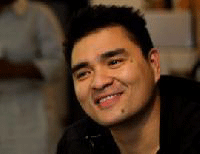For Jose Antonio Vargas, life has been a balancing act. The Pulitzer Prize-winning journalist seeks to report the truth as part of his profession but also, for more than a decade, has had to conceal a secret. Vargas outed himself as an undocumented immigrant in a first-person essay for The New York Times Magazine on June 22. Vargas, 30, came to the U.S. when he was 12 years old and discovered he was not a legal citizen at age 16.

Vargas has worked for the Washington Post and The Huffington Post. His coverage of the Virginia Tech shootings garnered a Pulitzer Prize, and his series on the HIV/AIDS epidemic in Washington was later turned into a documentary titled “The Other City.” Now, Vargas is behind Define American, a movement that seeks to define some of the issues and complexities shaping the immigration debate.
Vargas will speak tonight at 7:30 p.m. in Emerson Suites. The event is sponsored by the Park Center for Independent Media. Staff writer TinaMarie Craven spoke with Vargas regarding his immigration status and debate surrounding the immigration issue.
TinaMarie Craven: What exactly was it like to discover your immigration status when you were only 16 years old?
Jose Antonio Vargas: It was incredibly disorienting. I mean, how you would you feel if you went to the DMV and found out you weren’t who you thought you were? So it was very disorienting and alarming and frustrating. The first feeling I had was denial — that the woman at the DMV was lying to me. That was my instinct, and then when my grandfather confirmed what she said — that the green card was fake and that I should not be talking about my immigration status. For me, that was what I grew up with, and for me that was where my journalism career probably started in a way because I was asking questions: What the hell happened, how could that have happened, how did I get here then?
TC: How does it feel to know that, even though you have lived in America for a majority of your life, that the government does not legally consider you a citizen?
JV: In some ways, since I learned that I was undocumented, America was a fight. It was something for me to be. America was something I had to earn. It wasn’t something that was just given to me. It wasn’t something I was born into. It was something I needed to earn, and once I came to peace with that reality in my head — that I needed to earn it — I just kind of kept working, wanting to prove myself. Say that, ‘Look I’m contributing, I’m here. How can you say that I’m not supposed to be here or that I’m “illegal” if I’m writing all these stories? Have you seen my byline? I mean, I’m reporting the news. How can they say I don’t exist or that I’m not this person.’ Undocumented immigrants, we all get lumped into this one thing. People don’t know who we really are. People think, but they don’t really know.
TC: In your New York Times piece, you wrote, “If I was to succeed in a profession that is all about truth telling, I couldn’t tell the truth about myself.” How did that affect the way you saw yourself?
JV: I was very sorry and am very sorry that I had to lie about myself to get the jobs that I got. I am sorry that I didn’t know what else to do. It was either a question of do I get this job, contribute to society and pay taxes, or do I not get this job, work under the table and not pay taxes and live in the shadows. I chose to work. My job was to do the best job I possibly could. I was too paranoid to make a mistake, God forbid being charged with plagiarism or having a lot of corrections or people saying I needed to check a quote. I am a very diligent reporter. I’ve had maybe one dozen corrections in like almost a 12-year reporting career. That’s pretty good. And there are days where I think, yeah, I had to lie about my immigration status to get the jobs, but I don’t think my journalism — the work I produce — I don’t think people would question the quality of the work or the veracity of the work.
TC: How did your paranoia affect your relationships with others?
JV: Whenever you lie, whenever you hold a secret, whether it’s being gay or whether it’s being undocumented, it weighs upon you. I gave all these white lies to my friends about why I couldn’t go to a wedding in Mexico or why I couldn’t take a trip to Switzerland or why I wasn’t interested in being a foreign correspondent. It’s why I was so inspired by so many of the undocumented that have “come out.” That’s why I had to do what I had to do to “come out.”







